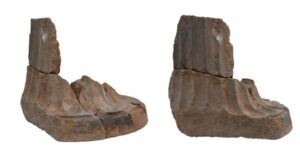
Proconnese marble base and shaft from the 5th century BC, recovered in El Turuñuelo (Image: Construyendo Tarteso Project).
During the seventh archaeological excavation campaign carried out last June at the Tartessian site of Casas del Turuñuelo (Guareña, Badajoz, España), 27 fragments of a base and a fluted shaft of an architectural element of marble from the Greek island of Proconnese (Asia Minor) were found. The discovery dates from the destruction phase of the site, dating to the late 5th century BC, which allows this piece to be dated to the 5th century BC. The object could be a Greek-style altar or a ritual ablution basin (perirranterion), since its precise functionality cannot be determined until the upper part of it is located. In the Iberian Peninsula, similar examples have been documented in the Greek city of Emporion (Empúries, l’Escala, Girona), made with local limestone, and in the Iberian oppidum of Mas Castellar of Pontós (Girona), carved with Greek Pentelic marble, bud with more modern chronologies than that of El Turuñuelo, given that they are located in contexts of the Hellenistic period.
This is yet another exceptional element of this Tartessian site, joining the discovery in 2017 of a female statue sculpted from Pentelic marble (see our February 2004 news), which demonstrates the uniqueness and importance of the site were prestigious Greek materials and products arrived from eastern Mediterranean.
The excavations are part of the Construyendo Tarteso project of the Instituto de Arqueología de Mérida of the CSIC, with the collaboration of the Junta de Extremadura, directed by Dr. Sebastián Celestino and Dr. Esther Rodríguez.
More information:
https://www.csic.es/es/actualidad-del-csic/investigadores-del-csic-hallan-el-altar-de-marmol-griego-mas-antiguo-del-mediterraneo-occidental-0
https://www.canalextremadura.es/noticias/extremadura/de-asia-menor-al-turunuelo-hallado-el-primer-altar-de-marmol-del-proconeso-0